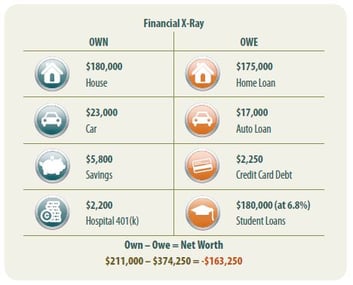
According to Smart Money MD, “Doctors or other people with relatively high incomes can spend a high percentage of their incomes before feeling the hurt, but once the hurt begins it is very difficult to reverse the damage.” It is important to learn the fundamentals of financial planning early in your career, so you’ll have a strong foundation for your finances when you transition into practice.
The goal of this guide is to provide you with both a starting point and a six step financial planning process for your financial journey.
While it may be intimidating to think about your financial future, the immediate goal is to focus on your short term goals (for the next 1-3 years) instead of long term goals. By focusing on your current financial situation, you will be better equipped to complete your training and avoid any major financial mistakes. There’s no need to look too far into the future right now (kids’ college, retirement, etc.). You have enough on your plate without worrying about the complex decisions that encompass long term planning. Financial planning is a process – one that can seem intimidating, vast, and insurmountable – but we will break it down into more manageable pieces.
Related: 4 Financial Stages of Physicians
Financial planning means different things to different people. To some, it may simply mean investments; to others, insurance; to others, a Swiss bank account, and a private jet. We believe that, at its roots, financial planning is simply making smart decisions about your money with your goals in mind. We’ve broken it down into six decisions you need to make about your finances that apply to you now and in the future.

What is your net-worth? I know this is a personal question and your answer might be discouraging. Your financial x-ray is a look at every financial decision you’ve made – good or bad, right or wrong. It’s a financial overview that shows you what you own, what you owe. The difference between the two is considered your net worth.

Many physicians and dentists in training have a negative net worth due to student loans. This is typical and shouldn’t discourage you. The main reason to start understanding your net worth now is to see how it increases or decreases over the years. You can positively affect your Financial X-Ray by either saving money (adding assets) or paying down debt (decreasing liabilities).

A budget is a guide that helps you increase your awareness of where your money is going and how much you are saving. It’s important to develop a budget early on as part of a strong financial foundation. It’s a common misconception that budgeting gets easier when you have more money. As the rapper Notorious B.I.G. famously said, “Mo’ money, mo’ problems.” Why is it important to develop a budget while you’re in training?
A budget will help you develop habits of saving, even if just $20 a month at the beginning. It is important to know your cash flow. No matter where you are in your career your cash flow is key.
Take a moment and consider your biggest asset. What is it? Most people think their biggest asset is their house, 401(k), or car. In reality, those assets make up a majority of your net worth, but your biggest asset is actually YOU and your ability to get up every morning and go to work. How will you protect it?
With most of your education behind you and a future full of potential earnings ahead of you, you need a plan to protect your future income. We suggest to analyze these different types of protection for a solid defensive plan:
Your Offensive Plan consists of planning for your cash needs in the future. Depending on your stage of life, your offensive planning needs will vary. While in training, it is often best to focus on your short term goals, the exception being 401k matching plans. Here are a few examples of typical future cash needs for physicians and dentists in training:
Short Term Goals| Less than 3 years
After you’ve completed training, it will be important for you to consider looking past those short-term goals and working towards medium-term goals (paying off student loans, purchase new car, kids education, etc), then reaching your long-term goals (retirement, dream vacation).
If you focus on long-term goals prematurely, it can have a negative effect on your satisfaction with your financial progress, as well as possibly hurting your current financial situation. Once you have established your short-term, medium-term, and long-term goals, create a funding strategy. Ask yourself, Do you have enough discretionary income available, or will you need to tighten your budget?
The easiest way to manage debt is to stay out of it, but that’s not always an option for residents and fellows. More than likely your current debt, although it may seem high, is probably at its lowest point. If you have $200,000 in student loan debt, but no mortgage, your debts are lower now than they will be if you eventually buy a home. Understanding debt management now is important for putting yourself in the best position as you acquire more debt and create a plan for paying it off. Here are a few important questions to consider when taking control of your money:
Getting a handle on your finances can seem overwhelming. Unfortunately it doesn’t get easier when you earn more money. The best time to develop healthy habits and understand your finances is while you’re in training. Life doesn’t slow down when you start practicing, and it doesn’t get easier.
Our hope is that these 6 steps of financial planning will be a useful tool to help you break down your financial plan into manageable steps. Your financial situation is always evolving as your life changes. Your goals will change over time, so it’s important to reassess your finances periodically to make sure you can make your goals a reality.
Remember – your ultimate goal is for you to control your money – not your money to control you.
CRN202202-260583

Shane Tenny is the managing partner of Spaugh Dameron Tenny. Along with hosting the Prosperous Doc® podcast, Shane has a true passion for behavioral finance, helping clients and audiences understand how to develop successful strategies based on their unique temperaments. An accomplished and highly engaging speaker, Shane is regularly interviewed for television and podcasts, is actively involved in the Financial Planning Association®, and contributes to industry advisory boards.
Whether you're launching your career, navigating a major life change, or preparing for retirement, it's never too early or too late to benefit from ...
Read More →This year, April 15th is the deadline to file your 2024 tax return, and it is quickly approaching. Whether you work with a CPA or another trusted tax ...
Read More →For those with significant financial success, a bonus represents more than just extra income. It’s a chance to create meaningful progress toward your ...
Read More →